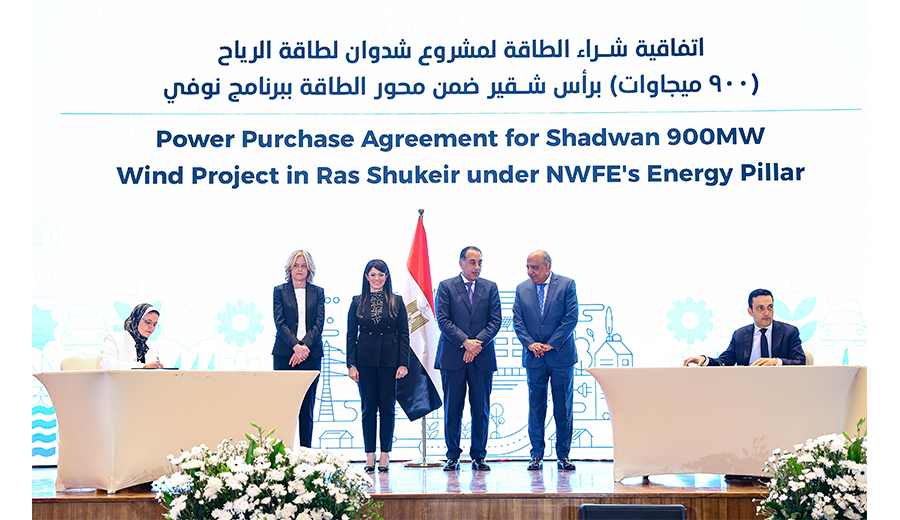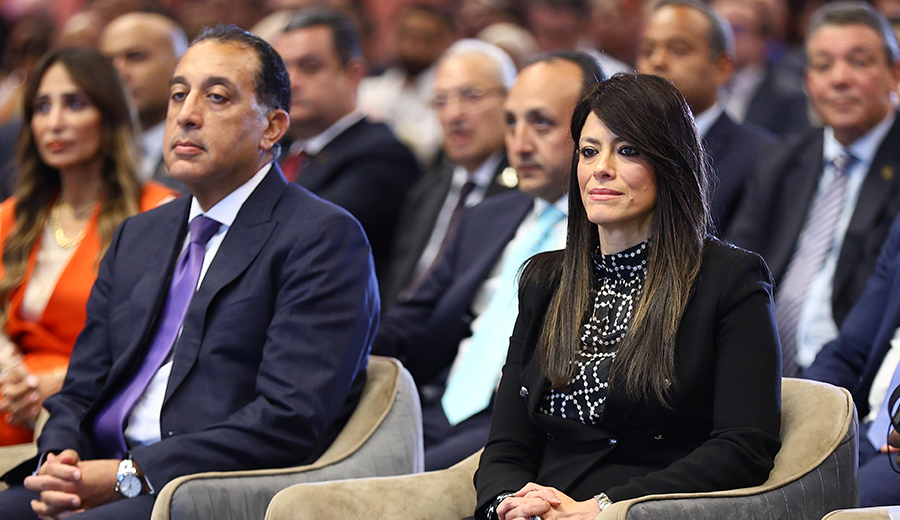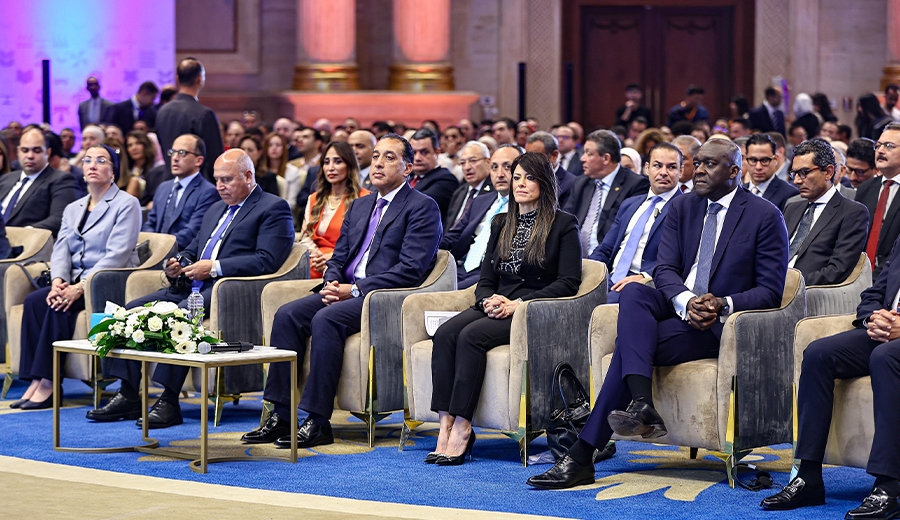Minister of Planning, Economic Development and International Cooperation Delivers Key Strategic Messages to the Private Sector and US Financial Institutions during Egypt-US Policy Leaders Forum
25 May 2025
In the presence of the Prime Minister, H.E. Dr. Mostafa Madbouly, the President of the American Chamber of Commerce, and investors from the United States and domestic and foreign private sectors…
Minister of Planning, Economic Development and International Cooperation Delivers Key Strategic Messages to the Private Sector and US Financial Institutions during Egypt-US Policy Leaders Forum
Dr. Rania Al-Mashat:
Full integration among the economic ministerial group to implement economic reform policies.
The launch of the National Narrative for Economic Development, next month, to outline the directions of the Egyptian economy.
We are following an approach that enables the private sector to lead economic growth and development.
Infrastructure, industry, innovation, and human capital are key pillars for the take-off of the Egyptian economy.
Industry, tourism, transport and storage, and telecommunications are key drivers of economic growth.
Continuous recovery of non-petroleum manufacturing industries supported by economic reform.
We are moving towards an economic growth model based on industry and export.
We continue structural reform to ensure the sustainability of macroeconomic stability.
The Egyptian economy shows resilience in dealing with regional tensions and global challenges.
Egypt is strengthening its regional position as a center for green transformation, trade, and logistics.
The Suez Canal Economic Zone is a promising platform for investment opportunities in various fields.
We invite investors to explore investment opportunities and capitalize on the momentum of economic reform.
Significant opportunities for partnership with the U.S. Development Finance Corporation (DFC) to finance the private sector.
The "NWFE" program is a platform to mobilize financing for the local and foreign private sector.
We have implemented strict measures for governing public investments and creating space for the private sector.
Private investment has exceeded public investment for two consecutive quarters, reflecting a real shift in the structure of the Egyptian economy.
Egypt is a hub for multilateral cooperation between international institutions and development partners.
Under the patronage of H.E. President Abdel Fattah El-Sisi, and honored
by the presence of H.E. Dr. Mostafa Madbouly, Prime Minister, H.E. Dr. Rania
Al-Mashat, Minister of Planning, Economic Development and International Cooperation,
participated today, Sunday, in the Egypt-US Policy Leaders Forum.
The forum was attended by Lieutenant General Eng. Kamel Al Wazir, Deputy
Prime Minister for Industrial Development and Minister of Industry and
Transport; Eng. Hassan El Khatib, Minister of Investment and Foreign Trade; Mr.
Ahmed Kouchouk, Minister of Finance; Eng. Karim Badawi, Minister of Petroleum
and Mineral Resources; members of the American Chamber of Commerce, led by
Suzanne Clark, President and CEO of the U.S. Chamber in Washington; Mr. John J.
Christmann, CEO of Apache Corporation and Chairman of the Egypt-US Business
Council; Eng. Omar Mehanna, Chairman of the American Chamber of Commerce in
Cairo; and Mrs. Herro Mustafa, the U.S. Ambassador to Cairo.
Also present were 61 CEOs and executive officials representing 42 major
American companies, and a number of representatives from the business community
and private sector in Egypt and the United States.
The two-day forum, organized by the American Chamber of Commerce in
Egypt in cooperation with the Egypt-US Business Council, reviews ways to
strengthen economic and trade relations between Egypt and the United States,
and available investment opportunities in Egypt with American companies.
In her speech, H.E. Dr. Rania Al-Mashat emphasized that today's forum
discusses the depth of specific and precise opportunities available to
investors in various vital economic sectors in Egypt. She highlighted the
"Investment Opportunities" booklet, prepared with the American Chamber
of Commerce, which represents a clear and comprehensive investment map
outlining the most prominent opportunities available to both local and foreign
investors. It also outlines the reforms and policies undertaken to pave the way
for new investments that will drive the Egyptian economy forward.
H.E. Dr. Al-Mashat affirmed the government's interest and keenness to
actively participate in direct dialogue with domestic and international
partners. She noted that the Egyptian state places investment and private
sector stimulation at the forefront of its national priorities.
H.E. Minister Al-Mashat reviewed the general framework underpinning
Egypt's current economic policies and the integrated reforms across fiscal,
monetary, trade, industrial, and investment policies. She pointed to the
general framework governing economic work in Egypt, where operations currently
rely on full coordination between various ministries and entities to achieve
genuine integration between public policies that serve the state's direction
towards building a strong, productive, export-oriented economy that generates
sustainable job opportunities.
H.E. Dr. Al-Mashat pointed out that this framework is based on three
pillars: achieving macroeconomic stability through regulating monetary and
fiscal policy, ensuring exchange rate stability, curbing inflation, achieving
fiscal discipline, and more efficient governance of public investments to
ensure efficiency and proper resource allocation, as well as achieving higher
transparency in state-owned companies, as part of the state's efforts to
separate ownership from management and improve governance; enhancing the
competitiveness of the Egyptian economy through infrastructure development,
legislative modernization, supporting digital transformation, and stimulating
innovation; and unlocking the potential of the private sector as the primary
driver of real long-term growth and the most important pillar for job creation
and raising productivity rates, through improving the business environment,
facilitating procedures, removing bureaucratic obstacles, increasing
transparency, and improving economic governance.
H.E. Dr. Al-Mashat highlighted the characteristics that distinguish the
Egyptian economy from other economies in the region, including its great
diversity and broad production base. It relies on many active sectors that
contribute to the GDP and provide huge employment opportunities, such as the
manufacturing sector, especially non-petroleum industries, which recently
recorded record growth rates of about 18%, a sustained growth achieved over
three consecutive quarters.
Also, the tourism sector has witnessed a strong recovery, particularly
with the imminent opening of the Grand Egyptian Museum next July, which will
represent a qualitative leap in the cultural tourism experience in Egypt.
The telecommunications and information technology sector is growing at a
steady pace, achieving growth rates of up to 10%, and is one of the most
attractive sectors for youth and investors.
The transport and logistics sector, a strategic sector reflecting
developments in ports and infrastructure, has recorded growth close to 10%.
Moreover, Egypt possesses a young, skilled, and competitively priced
workforce, a huge human resource that the government seeks to maximize its
utilization through training and skill-building programs.
H.E. Minister Al-Mashat mentioned the macroeconomic developments and
performance indicators, referring to the bold measures taken last March. Since
then, the Egyptian economy has witnessed significant transformations, most notably
achieving great stability in the exchange market, the disappearance of the
currency black market, the adoption of a strict disciplinary fiscal policy
aimed at reducing the deficit and achieving a primary surplus, and more
efficient governance in managing public investments, ensuring efficiency and
proper allocation of resources, as well as achieving higher transparency in
state-owned companies, as part of the state's efforts to separate ownership
from management and improve governance.
H.E. Dr. Al-Mashat added that private investments have also witnessed a
remarkable recovery, with their contribution to the GDP exceeding that of
public investments for the first time in years, which confirms the success of
efforts to open up opportunities for the private sector.
Remittances from Egyptians abroad have also increased, returning to
their previous levels, while tourism this year is recording the highest number
of visitors and revenues in years.
She stressed that despite regional challenges and the decrease in Suez
Canal revenues due to geopolitical circumstances, Egyptian growth and exports –
whether finished goods, semi-finished goods, or raw materials – continue to
rise, reflecting an improvement in the economy's structure and diversification.
Regarding the shift towards a productive and export-oriented economy,
H.E. Dr. Al-Mashat stated that Egypt is gradually transitioning from an
economic model relying on non-tradable sectors to a model based on production,
industry, and export, as this is the path to creating sustainable job
opportunities and achieving real, high-productivity growth. Therefore, there is
a significant focus on making Egypt a regional hub for green energy, through
ambitious projects in solar, wind, and green hydrogen, a regional hub for food
security, by supporting value-added chains in agriculture and food industries,
and a center for trade and logistics, through developing ports and linking them
to development axes and industrial zones.
The Minister also pointed to how to build a more sustainable economy,
noting that macroeconomic stability is the foundation, but it is not enough on
its own. Therefore, the government is working to implement an ambitious
structural reform program based on three main pillars: enhancing macroeconomic
resilience to ensure sustainable financial and monetary stability; stimulating
competitiveness and enhancing the role of the private sector through improving
legislation, simplifying procedures, and encouraging entrepreneurship; and
supporting green transformation and transitioning towards a low-carbon and
sustainable economy, in line with Egypt's environmental commitments and
sustainable development goals.
H.E. Minister Al-Mashat reaffirmed that green transformation is not just
an environmental issue, but a real opportunity for investment, employment, and
export. All these opportunities aim to support economic development, thereby
creating wider fiscal space for the state. "We are moving from a negative
economic cycle relying on a fixed exchange rate, independent monetary policy,
and unstable capital flows, to a positive cycle based on macroeconomic
stability, structural reforms, and development."
H.E. Dr. Al-Mashat also reiterated the importance of financing for
development, noting that Egypt has become an important platform for cooperation
with international institutions. These institutions not only finance the
government but also provide financing to the private sector, using multiple
financing tools and mechanisms.
She explained that over the past five years, the private sector in Egypt
has received more than $15 billion in concessional financing, which is a very
important factor in attracting more foreign direct investment.
H.E. Dr. Al-Mashat highlighted the "NWFE" platform, explaining
that addressing climate challenges can simultaneously be an opportunity for
development. Egypt has adopted this approach in developing its country platform
for the "NWFE" program to link climate finance with priority
development projects in the energy, food, and water sectors. This has
contributed to attracting international private sector investments of about $4
billion within two years, to generate 4 gigawatts of renewable energy. These
funds have gone to both Egyptian and international companies, with financing
from international institutions and commercial banks, in addition to grant
components added to reduce the burden of financing.
She clarified that this presents an opportunity for American companies
aiming to enter the Egyptian market, especially in the areas of clean energy
and sustainable infrastructure.
She also referred to projects related to electrical energy storage to
help achieve Egypt's national goal of deriving 42% of its energy from renewable
sources by 2030. She explained that among the other key pillars of development
in Egypt are trade and logistics, as Egypt is currently working to become a
regional trade hub.
She pointed to the development of many ports – both maritime and dry –
through public-private partnerships, financed by international sources, as well
as the development of digital systems to facilitate trade, which has
contributed to improving Egypt's ranking in the World Bank's Logistics
Performance Index, where it jumped to 54th place in 2023.
H.E. Dr. Al-Mashat announced the upcoming launch of Egypt’s National
Narrative for Economic Development next June, which will include key insights
covering: macroeconomic stability, foreign investment flows, industry and trade
performance, and workforce readiness.
She affirmed that Egypt's goal is focused on achieving real growth,
providing job opportunities, and enhancing the economy's resilience in the face
of global and regional crises.
In response to a question about how Egypt balances long-term development
planning with the need for flexibility in a rapidly changing global economy,
H.E. Dr. Rania Al-Mashat confirmed that Egypt, like other countries, is
navigating through overlapping crises, from climate change and geopolitical
shifts to technological acceleration, all of which require a delicate balance
between commitment to long-term development goals and the quick adaptability to
emerging global challenges.
H.E. Minister Al-Mashat pointed to Egypt's endeavors to achieve this
balance through an institutional transformation towards integrated policy-based
planning. She noted that the General Planning Law, which establishes the
medium-term economic plan, is now closely linked to the Unified Public Finance
Law, ensuring consistency in plans, budgets, and fiscal policy. This
integration enables responsible adjustment of goals in response to various
evolving challenges.









